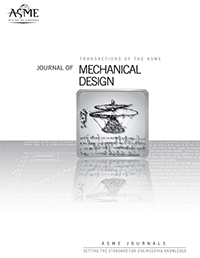In today’s rapidly evolving world, data plays a pivotal role across various sectors including engineering. The success of data-driven methods in image and text analysis is largely due to adequately large datasets, which have advanced deep learning and enabled tools like ChatGPT, Bard, and Stable Diffusion. Data-driven design is revolutionizing engineering design, enhancing design theory, decision-making, optimization, and educational curricula, and enabling faster design exploration and real-time operations management. Challenges in adopting machine learning for engineering design include limited publicly available datasets, datasets with insufficient number of samples and features, lack of datasets integrating functional performance, and the need for high-quality data.
This special issue provides a platform for papers that investigate data-driven methods for design, provide insightful discussions about the data used, and also publicly release their dataset. It also encourages submissions to address critical challenges in engineering dataset creation, such as multi-modality, handling missing information, managing diverse data types, navigating dependencies among attributes, ensuring data quality, and integrating complex data structures and real-time data. The special issue hopes to facilitate collaborations between academia and industry and encourage discussion on practices for the publication of datasets in the engineering design community. In particular, we seek papers that release datasets in, but not limited to the following areas:
- Design Artifacts and Simulations
- Complex 2D or 3D design artifacts with high-quality numerical simulations of performance
- CAD data including product and manufacturing process features
- Mechanical components, such as mechanisms, gears, bearings, linkages, and their assemblies, e.g., gear train designs
- Logs of sequential actions taken by human designers using design tools
- Data collected to build digital twin models
- Multi-modal representations of design artifacts, e.g., text, images, parameters, mesh, and CAD data
- Synthetic data augmentation of existing datasets either through more data points or additional label and performance metrics
- Complex Systems
- Data on integrated mechanical systems, electrical networks, and socio-technical systems, e.g., datasets of automotive systems, energy networks, and shared mobility
- User preferences data that allows modeling and prediction of consumer needs and user preferences in engineering design
- Operational data of complex engineering systems used for condition monitoring, fault diagnosis, remaining useful life prognosis, or digital twin systems that would facilitate meaningful system design decision making
- Life cycle data for engineering products or product families that enable multiple generation product design decision making
- Human-Centered Design
- Interactions in design teams during problem-solving and design ideation activities
- Outputs from educational activities with labels according to rigorous quantitative or qualitative analysis
- Data enabling engineering design education research
- Material and Manufacturing
- Data from manufacturing processes and generated parts
- Actions taken by engineers while interacting with complex manufacturing systems (e.g., additive manufacturing machines)
- Data quantifying manufacturing induced variation for design under uncertainty
- Datasets for functional material design
- Microstructure datasets that allow processing-structure-property mapping
Submission Guidelines
- We welcome two types of submissions:
- Full research papers that investigate data-driven methods and also publicly release the dataset used in the paper. The dataset should be described and its connection to engineering design must be demonstrated and discussed. In addition to contributing new data-driven methods, the submission should be characterized by its relevance to current engineering problems, the novelty of the data it contains, and its potential to facilitate new types of analysis or insights in the field of engineering design.
- Technical briefs should describe datasets, their application in design, and contribution to data-driven engineering, without necessarily including a design method contribution. Technical briefs must have detailed, insightful discussions or examples of the data usage in the context of design.
- Authors must submit relevant datasets alongside their papers if they want to be included in the special issue.
- Each paper must have a separate section describing the dataset. The following information must be included in that section:
- A description of the data, including the description of the collection, generation, and preprocessing protocol.
- A description of the engineering design context along with an insightful discussion on why and how the dataset can be useful for engineering design research.
- A description of how their submission satisfies FAIR principles (Findable, Accessible, Interoperable, Reusable).
- Papers should include a section near the acknowledgments detailing the ownership, permissions, and any previous usage of data. Authors are responsible for ensuring they adhere to licensing terms for their datasets. Whenever applicable, they should provide information on informed consent and ethical approval for human data.
- Below are additional guidelines about the datasets:
- Novelty: Both existing and new datasets are acceptable, as far as the authors add sufficient value to the dataset (for example, augmenting datasets with new simulation results).
- Size: Datasets should have enough variables and samples to support robust research. Authors should justify their dataset size, ensuring it’s sufficient for their research goals.
- Hosting: To facilitate fit, the authors will be requested to provide (anonymous) access to the dataset at the time of the submission for the reviewers to review. Authors can choose how they host their data to best fit their needs. For example, options include institution-run repositories, journal supplementary material, public archival repositories (Github, Harvard Dataverse, Zenodo, OSF), or, if necessary, general-purpose file-sharing services (e.g., Dropbox, Google Drive). The authors must commit to making the dataset publicly available at the latest when the publication is published online. Access can be controlled if required by ethical protocol.
- Availability Duration: Authors should ensure data is publicly available for at least 10 years after paper acceptance.
- Review criteria: Our review process will encompass a thorough evaluation of not only the design methodology but also the datasets, focusing on aspects such as data integrity, relevance to engineering design, compliance with quality standards, size of the dataset, and adherence to FAIR principles, and a detailed assessment of the accompanying manuscript. This ensures that full research paper submissions not only present high-quality data but also robust data-driven methods or applications, demonstrating how the datasets are integral to innovative methodologies or applications in the field. A key review criterion will be to assess if the dataset provides substantial value to the engineering design community.
- Papers should be submitted electronically to the journal at journaltool.asme.org. If you already have an account, log in as author to your ASME account. If you do not have an account, sign up for an account. In either case, at the Paper Submittal page, select the ASME Journal of Mechanical Design and then select the special issue Design by Data: Cultivating Datasets for Engineering Design.
Special Issue Timeline
- Paper Submission Deadline Extended to July 1, 2024
- Initial Review Completed: September 1, 2024
- Publication: March 1, 2025
Guest Editors
Dr. Faez Ahmed, Massachusetts Institute of Technology, faez@mit.edu
Dr. Cyril Picard, Massachusetts Institute of Technology, cyrilp@mit.edu
Dr. Michael Kokkolaras, McGill University, michael.kokkolaras@mcgill.ca
Dr. Wei Chen, Northwestern University, weichen@northwestern.edu
Dr. Christopher McComb, Carnegie Mellon University, ccm@cmu.edu
Dr. Pingfeng Wang, University of Illinois Urbana-Champaign, pingfeng@illinois.edu
Dr. Ikjin Lee, Korea Advanced Institute of Science & Technology, ikjin.lee@kaist.ac.kr
Dr. Tino Stankovic, ETH Zurich, tinos@ethz.ch
Dr. Douglas Allaire, Texas A&M University, dallaire@tamu.edu
Dr. Stefan Menzel, Honda Research Institute Europe, stefan.menzel@honda-ri.de



